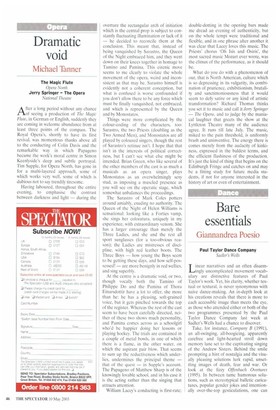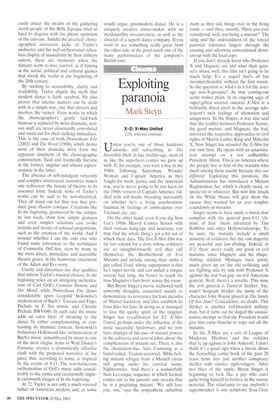Bare essentials
Giannandrea Poesio
Paul Taylor Dance Company Sadler's Wells
T inear narratives and an often disarm ngly uncomplicated movement vocabulary are distinctive features of Paul Taylor's work. Yet, his clarity, whether textual or textural, is never synonymous with naive dance-making. An in-depth look at his creations reveals that there is more to each accessible image than meets the eye, as those who attended either or both of the two programmes presented by the Paul Taylor Dance Company last week at Sadler's Wells had a chance to discover.
Take, for instance, Company B (1991), an all-swinging, all-boogieing, apparently carefree and light-hearted stroll down memory lane set to the captivating singing of the Andrew Sisters. Behind the smile prompting a hint of nostalgia and the visually pleasing solutions lurk rapid, unsettling images of death, fear and war. Or look at the fizzy Offenbach Overtures (1995). In between tame humorous solutions, such as stereotypical balletic caricatures, popular gender jokes and intentionally over-the-top gesticulations, one can easily detect the strains of the gathering storm people of the Belle Epoque tried so hard to disguise with the phony optimism of the can-can. Amidst the precisely choreographed irreverent kicks of Taylor's midinettes and the well-orchestrated ridiculous display of masculinity by their military suitors, there are moments when the dancers seem to lose control, as if hinting at the social, political and cultural quakes that shook the world at the beginning of the 20th century.
By sticking to accessibility, clarity and readability, Taylor dispels the myth that modern dance is fairly cerebral. He also proves that intense matters can be dealt with in a simple way, one that attracts and involves the viewer. Even works in which the choreographer's gentle laid-back humour is replaced by more dramatic, serious stuff are never structurally convoluted and stand out for their striking immediacy. This is the case of both Promethean Fire (2002) and The Word (1998), which derive most of their dramatic drive from the apparent simplicity of the choreographic construction, fluid and frantically hieratic in the former, angular and almost expressionistic in the latter.
The absence of self-indulgent virtuosity and complex intertextual narratives makes one rediscover the beauty of theatre in its essential form. Indeed, none of Taylor's works can be said to be non-theatrical. They all stand out for they way they produce pure illusion comique. Creations like In the beginning, premiered by the company last week, show how simple gestures and even simpler solutions can evoke notions and stories of colossal proportions, such as the creation of the world. And I wonder whether I am the only one who found some references to the techniques of Commedia Dell'Arte, seen by many as the most direct, immediate and accessible theatre genre, in the humorous enactment of the Adam and Eve story.
Clarity and directness are also qualities that inform Taylor's musical choices. In the beginning relies on an intriguing orchestration of Carl Orffs Carmina Burana and Der Mond, while Prornethean Fire draws considerably upon Leopold Stokowksi's orchestration of Bach's Toccata and Fuge, Prelude in E flat minor. and Chorale Prelude BWV680. In each case the music adds an extra layer of meaning to the dance by either complementing or contrasting its thematic content. Stokowski's boisterous Hollywood-like orchestration of Bach's music, remembered by many as one of the most elegiac items in Walt Disney's Fantasia, creates a dramatically effective clash with the proposed narrative of the piece that, according to some, is inspired by the events of 9/11. The non-boisterous orchestration of Orffs music adds considerably to the comic and occasionally slightly cartoonish images of In the beginning.
At 72, Taylor is not only a much revered father of American modern and, as some would argue, postmodern dance. He is a uniquely creative dance-maker with an inexhaustible inventiveness, as well as the director of a superb dance company. If you want to see something really great from the other side of the pond catch one of the many performances of the company's British tour.



































































 Previous page
Previous page